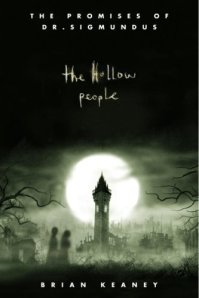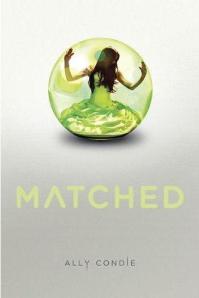Livian Brian let his gaze drift over me slowly, and small hairs at the back of my neck stood on end. The exchange took less than a second, but it revealed to me that he too had learned to pass inspection. It was dangerous, and more than I was frightened that he could pass, I was terrified that he knew I could as well. He had the power to, in an instant, expose me and effectively draw my careful planning to a close. If he were anyone but Livian Brian I might have had the same power over him, but as it were I didn’t.
Tag Archives: dystopia
Hook #7: Snow Globe
Filed under Hooks
The Hollow People by Brian Keaney
 Inside Flap of the Book: Dante looked around, making sure there was no one who might overhear him. Then he leaned forward and, lowering his voice, said, “I still have dreams.” It was the most shocking thing Bea had ever heard. “Dr. Sigmundus says that disturbances of the mind which come to people when they sleep are the result of a psychic illness,” she replied. It was what she had been taught at school, and for as long as she could remember.
Inside Flap of the Book: Dante looked around, making sure there was no one who might overhear him. Then he leaned forward and, lowering his voice, said, “I still have dreams.” It was the most shocking thing Bea had ever heard. “Dr. Sigmundus says that disturbances of the mind which come to people when they sleep are the result of a psychic illness,” she replied. It was what she had been taught at school, and for as long as she could remember.
Review: The Hollow People is a novel set on an isolated island called Tarnagar where the lives of its people revolve around the upkeep of the asylum located there. Status is a very important thing in this world, which is why Dante, marked with the lowest status for being the child of a inmate, is convinced that his existence is completely insignificant. When a dangerous new criminal named Ezekiel is brought to the asylum and sets in motion a plan of rescuing Dante from Tarnagar, Dante learns that he is not only a significant person in this world, but an important weapon against Dr. Sigmundus, the Big Brother-esque dictator of the country.
This novel reminds me a lot of 1984 by George Orwell in that the citizens of this country are very careful about the decisions they make, and very concerned about how their actions are interpreted by others—but that’s only part of the novel. What really sets this novel apart from others of this style/genre is the supernatural element introduced later in the book—which I kind of hate. The supernatural element gives God-like powers to Ezekiel who has been a prisoner on Tarnagar for a month, receiving little food and getting shock treatments at least 3 times a week, but manages to successfully use his powers to help Dante escape. Yet after escaping and being well fed and taken care of for weeks, a shot that clips him in the shoulder renders him handicapped forcing Dante to use his magically super advanced powers to save the day… Bullshit. I call bullshit. It was like reading a well-written, but nevertheless shitty, fanfiction. So it’s not surprising to me that I haven’t hear a lot of hype about this novel since I bought it about 3 years ago. As a series, it may have gotten better, but I’ll never know, because I don’t plan on purchasing the other books unless Keany gets a movie deal.
The best thing about this book is that it really does seek to break the mold, not only does the supernatural element set this novel apart, but it also has small illustrations scattered throughout it, which appealed to the child inside of me that remembered sitting in the library reading Robert Munch picture books. The worst thing about this novel is the supernatural element. To help you understand, I’ll use Harry Potter as a parallel. Imagine a wizarding world where people try for years and years to learn how to ride a broom, and only Dumbledore and James Potter manage to succeed. Then Harry Potter comes to Hogwarts for the first time, Madame Hooch tell him how he should mount a broom, he mounts it, and instantly wins the Quidditch World Cup. Yeah, I think it sounds like a shitty idea too.
Filed under Book Reviews, Faux-Utopia, Romance, Supernatural, YA Fiction
Hook #3: If I Should Die Before I Wake
The blue horizon stretched across my vision and wild blooms with strange dotted petals bat against my legs. Dad would have loved it. They all would have. Giant shining beams of light flashed in the distance. It was like granddad’s movies from when he was a kid. At first I never wanted to watch them. They were black and white, the sounds were made by people, and the effects by shining different lights on the screen. Soon I found myself looking forward to those nights. Now it was just me, Evie, and flashing beams of light against a blue horizon.
Filed under Hooks
Matched by Allyson Condie
 First Paragraph: Now that I’ve found the way to fly, which direction should I go into the night? My wings aren’t white or feathered; they’re green, made of green silk, which shudders in the wind and bends when I move—first in a circle, then in a line, finally in a shape of my own invention. The black behind me doesn’t worry me; neither do the stars ahead. I smile at myself, at the foolishness of my imagination. People cannot fly, though before the Society, there were myths about those who could. I saw a painting of them once.
First Paragraph: Now that I’ve found the way to fly, which direction should I go into the night? My wings aren’t white or feathered; they’re green, made of green silk, which shudders in the wind and bends when I move—first in a circle, then in a line, finally in a shape of my own invention. The black behind me doesn’t worry me; neither do the stars ahead. I smile at myself, at the foolishness of my imagination. People cannot fly, though before the Society, there were myths about those who could. I saw a painting of them once.
Review: Matched is an faux-utopian I swear I should coin that term universe. Their government acts much like a librarian on crack and meticulously sorts everyone into a place in society that has the highest percentage of universal success. Based on each individual’s unique characteristics they are sorted into categories deciding everything from who to marry, which food to eat, and which trees to plant, to how many weights to lift at the gym. Cassie, the novel’s heroine, is initially primarily concerned only with who she will be matched with at the matching banquet. Quite simply they arrive at this banquet, a computer tells them who they will marry, and then they begin a process of getting to know the person. At this point suddenly an image of Jdate.com pops into my mind as I think of how similar this is to internet dating. Except of course for the fact that if you meet the person and they have giant buck teeth and a unibrow you can’t change your mind.
The problem Cassie has it that for a quick second before her announced match is revealed the computer flashes an image of another boy named Ky Markham. DUN DUN DUNNNNNNNN.
Since she is the heroine of the novel it would be completely unacceptable in every way for her to simply move on, so she pursues Ky and ultimately falls in love with him instead. I would say spoiler alert but it’s such an obvious outcome that it seems unnecessary to do so. Thankfully not everything in the novel is so predictable and a lot of twists and turns develop out of Cassie’s new interest in Ky. Cassie starts to figure out that the perfect uptopia she lives in, is in fact, not as it appears.
What’s most commendable in this novel is how Condie took an initially flighty and shallow girl and developed her into an intelligent and inquisitive young woman—if I can say so without sounding like a mother at her teenage daughter’s high school graduation. Quite often I don’t particularly like female protagonists as they tend to blend in with the background. The male lead always seems more interesting likely because they have to be unique to catch the protagonist’s attention. Sadly, Matched is no different. Ky Markham is still 500 times more exciting, character wise, than Cassie. Even with her acts of rebellion and new outlook on life, when reading a scene with Cassie I found myself wondering what Ky was doing.
While I did enjoy the novel and will definitely be reading more of this series, for its inability to make its protagonist more likable than her love interest, I highly doubt it will be counted amongst my favourite reads. With more of these sorts of faux-utopian novels coming out (Hunger Games, Matched, The Maze Runner, Uglies, Year of the Flood, I could seriously go on forever…) Matched is still able to come up with a fresh concept. This makes me happy because at the rate people are going I’m afraid we might run out of ways to destroy the world as we know it, and give birth to a new world where people are ignorant to their own oppression.
Filed under Book Reviews, Faux-Utopia, Romance, YA Fiction
Never Let Me Go by Kazuo Ishiguro
 First Paragraph of Book: My name is Kathy H. I am thirty-one years old and I’ve been a carer for over eleven years. That sounds long enough, I know, but actually they want me to go on for another eight months, until the end of this year. That’ll make it almost exactly twelve years.
First Paragraph of Book: My name is Kathy H. I am thirty-one years old and I’ve been a carer for over eleven years. That sounds long enough, I know, but actually they want me to go on for another eight months, until the end of this year. That’ll make it almost exactly twelve years.
Review: I first encountered this book in grade twelve when it was recommended to me by my English teacher for an essay. I read the first line and immediately put the book back down. My thoughts were: This book is garbage and sounds like a poorly read seven-year old wrote it… or like the epilogue of Harry Potter and the Deathly Hallows. In all honesty, the only reason I gave this book a second chance was because I heard a movie adaptation would be coming out starring Andrew Garfield, who I adore. While I strongly disagree with how Ishiguro chose to begin this novel, I strongly urge others to push past the opening and continue on with the novel.
Never Let Me Go tells the story of a specific sub-section of society that are raised with the knowledge that they will eventually be required to donate all their vital organs and will likely never see their 30th birthdays. Specifically it follows Kathy H. who attends Hailsham, a sort of Harvard among the other boarding schools for these types of children.
Kathy is a protagonist that prefers to take a more passive role in life as a student in Hailsham. Her most outlandish action as a child is befriending Tommy, a boy rejected by his peers for consistently throwing raging temper tantrums and being bad at art. Yes, bad at art. People in Hailsham have giant hard-ons for art, and students who can draw little more than stick figures are mocked. While Tommy doesn’t become better at art until he leaves the school, he manages to keep his temper in check and become accepted by his peers. He even does one better and begins to date Kathy’s best friend Ruth. Despite the fact that Kathy likes Tommy, on Ruth’s request, she spends her efforts on keeping Ruth and Tommy together.
Kathy is not a fighter. As a character she comes off as doormat and often I couldn’t tell if she was ridiculously self-sacrificing or simply too cowardly to pursue her own goals. But somehow, as a character she is still likeable. While she is essentially Ruth’s bitch for a large portion of the novel, she also has moments where she can be cruel, or be as frustrated with herself as the reader is with her. The best thing about this novel, besides the cool faux-utopian plot, are the characters. Kathy H. may be the main point of view but her relationships with the others are so realistic and well-developed that even the minor characters have the positive and negative traits that make each person uniquely human.
It is these traits that make the novel so beautiful and sad. It’s impossible to move people with a book driven almost entirely by plot with flat, neglected characters. I like this novel because the characters are so human and real that by the end Kathy H. becomes more than the thirty-one year old carer we were introduced to in the beginning, she becomes as real as anyone you might meet on the street.
Filed under Adult Fiction, Book Reviews, Coming of Age, Faux-Utopia, Romance
The Hunger Games by Suzanne Collins
 Back of the Book – In the ruins of a place once known as North America lies the nation of Panem, a shining Capitol surrounded by twelve outlying districts. The Capitol is harsh and cruel and keeps the districts in line by forcing them all to send one girl and one boy between the ages of twelve and eighteen to participate in the annual Hunger Games, a fight to the death on live TV.
Back of the Book – In the ruins of a place once known as North America lies the nation of Panem, a shining Capitol surrounded by twelve outlying districts. The Capitol is harsh and cruel and keeps the districts in line by forcing them all to send one girl and one boy between the ages of twelve and eighteen to participate in the annual Hunger Games, a fight to the death on live TV.
Sixteen year old Katniss Everdeen regards it as a death sentence when she steps forward to take her sister’s place in the Games. But Katniss has been close to death before–and survival, for her, is second nature. Without really meaning to, she becomes a contender. But if she is to win, she will have to start making choices and weigh survival against humanity and life against love.
Review – The Hunger Games has become a hot topic with it’s rising popularity as a YA (young adult) novel and the upcoming release of the theatrical adaptation in 2012 starring Jennifer Lawrence (Actress, Academy Award Nominee). I will not be the first to say that this novel deserves its new found popularity. It’s a little bit of Battle Royal and 1984 with the added flare of today’s reality show craze.
I’m just going to say it straight up, who doesn’t find the idea of a fight to the death exciting? While most people today would turn away in the disgust at the prospect of watching a reality show depicting just that, in The Hunger Games people living in the Capitol anticipate these games each year.
When I picked up the book I didn’t expect to be truly entertained until the games started, but was pleasantly surprised to find myself wracked in suspense from the beginning. As a reader you only know as much as the heroine Katniss Everdeen does, so it’s a very immersive experience because as she’s sitting on a train wondering what the firetruck is next, you’re wondering the same thing. Every step along the way you’re discovering this new world with her, which is a feeling that readers want to experience—few things are better for an avid reader than getting lost in a book.
The Hunger Games does have a romance aspect to it, but the plot never falls secondary to the romance. If I had to say it simply, sometimes Katniss just has bigger shit to deal with. She’s a character that I think could provide girls with a much stronger literary role model since Bella Swan has them crying in their bedrooms and listening to Evanescence. If Katniss needs to get something done she has no problem doing it herself. She isn’t a princess waiting for someone to save her, she’s saving herself. That being said, for readers who happen to be helpless romantics like myself, you won’t be disappointed as the novel reaches a nice healthy medium between the romance and action.
If I had to say anything negative about the novel it would be that a lot of characters are introduced and sometimes it’s difficult to keep up. However, this may also just be because if I don’t find a character particularly interesting I tend to ignore their role. Thankfully Collins doesn’t superfluously add characters and I found that each character, however minor they seemed, later in the series had a significant purpose or was part of a major event.
Like most YA novels the writing wasn’t itself didn’t seem particularly noteworthy, this really is a novel driven by plot and development of a few main characters. And best of all, Collins isn’t shy about giving gruesome details, so people tuning into for the action will have a lot to look forward to.
Filed under Action-Adventure, Book Reviews, Faux-Utopia, Romance, YA Fiction








